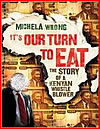Thursday, March 05, 2009
By Edward Clay
 REVIEW OF: It’s Our Turn To Eat – The story of a Kenyan whistleblower, by Michela Wrong, (Paperback) Fourth Estate Ltd, London (19 Feb 2009), 400 pages
REVIEW OF: It’s Our Turn To Eat – The story of a Kenyan whistleblower, by Michela Wrong, (Paperback) Fourth Estate Ltd, London (19 Feb 2009), 400 pages
“It’s our turn to eat” is about corruption in Kenya. The title quotes the appeal his ethnic peers made to John Githongo-–the man they had appointed as presidential adviser on corruption–not to betray their collective interests by doing that job properly.
The election of a reforming government in late 2002 had raised high expectations of change in that most distinctive characteristic of Kenya’s political culture, corruption. It was expected that past scandals would be investigated and resolved and the first steps taken in preventing future corruption.
At last, evidence emerged which seemed strong enough to sustain action. Inquiries in these years began to inform us all on the Goldenberg scandal–-the definitive scandal of the Moi era-–and the Anglo-Leasing scams which came to light under the new President, Mwai Kibaki. But the government prevented action.
There is inevitably a lot of detail and Michela Wrong handles it beautifully, with the style that made her two previous books so engrossing.
There is a grand theme too in “It’s our turn to eat”: betrayal. The story is Shakespearean in its sweep.
John Githongo was brought from a post as a well-known campaigner against corruption to one of the most exposed jobs in government. He came from the right background to work from within the new establishment. Enormous hopes reposed in him. Yet, as he turned over the stones, it was borne in on him that he was being impeded not just by inertia and the culture of ingrained acceptance of wrongdoing. He was being obstructed, deliberately, by the very people at the heart and at the top of the government which had appointed him.
At first, they cautioned him with Talleyrand’s advice to his diplomats: “Surtout, messieurs, point de zele” (Above all, gentlemen, no zeal). Then they turned on him with accusations of betrayal–-of his President, of his government and, above all, of their ethnic and economic interests. Ironically, the betrayal was theirs. Its ugliness led to Githongo’s flight in fear of his life in early 2005.
Michela Wrong does this grand theme proud. She brings the protagonists to vivid life. The heroes are all the better for being portrayed without sentimentality and with warts.
The question by the last page is: was it all worth it? Does the story end in disillusionment? For some who believed in Githongo’s campaign, and admired his steadfastness, quite possibly.
The price was high for its central figure. But Githongo is not disillusioned. For him, the struggle is to stop politicians robbing their own people. Githongo admits his error in believing that elaborate institutions could effect reform. The state’s institutions, including the law, can be and have been deformed by corruption.
He now says he puts his hopes in ordinary people and their growing anger about their rulers’ abuse of the trust laid on them.
The now thecat is out of the bag. It is for Kenyans to hold to account those who make them poor by diverting public money from the public good to private ends.
There are lessons for Kenya’s overseas friends, too. We development partners must re-examine our official national and multilateral aid programmes, and the implicit and explicit understandings on which they are predicated.
And we should raise our own game. Britain is shamed by the OECD’s fierce criticisms of its failure to carry out our international obligations against corruption.
With the banking system in pieces, perhaps now is the time to cleanse its dark corners–-and the dark corners of other professions traditionally held in high regard–of their readiness to handle money stolen from struggling people in poor countries. That money has been appropriated by the indecently rich in poor countries who regard government not as a trust or contract with the governed, but as their private possession.
We should have nothing to do with the money nor the thieves beyond returning the first and exposing and isolating the second.
We should stop sheltering bad governments from the consequences of their people’s dissatisfaction. The so-called donors should align their taxpayers’ interests with Kenyans’. Kenyans are hard-headed people. They do not understand the perverse and indulgent waste of donor money on their corrupt leaders. They see our ministers and similar signing cheques and glad-handing those they know to be on the take. They are confused about the message their donor friends wish to send.
If John Githongo is right, then the ordinary people must be encouraged to exercise more rigorously and effectively their democratic right to hold corrupt governments to account. The aid-givers should get out of the way. They should no longer come between the lion and his wrath.
Sir Edward Clay was Britain’s High Commissioner to Kenya from 2001-2005 when he was outspoken on governance questions including corruption.
Michela Wrong is a reporter who has worked throughout Africa for Reuters, the BBC and the Financial Times. "In the Footsteps of Mr Kurtz", her first book, won the PEN James Sterne Prize for non-fiction.
It’s Our Turn To Eat – The story of a Kenyan whistleblower, by Michela Wrong, was published on 19 February 2009


